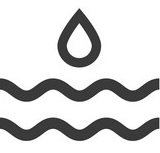
The following example curricula list the recommended courses for each track. Students are required to earn 30 credits total, with at least 24 credits at the 60000 level or higher, and the remaining 6 credits at the 40000 level or higher.
For students entering the program with non-EAC/ABET-accredited undergraduate degrees who are targeting careers requiring professional engineering (PE) registration, please review the information at the bottom of our “Who Should Apply?” page regarding credential evaluations.
Environmental Engineering – Water Quality, Treatment, and Recovery (Track A)
Track A is for students with undergraduate degrees in environmental engineering or in civil engineering with an environmental engineering concentration or minor. Students in this track must have previously taken courses in fluid mechanics and hydraulics. Students with undergraduate degrees in other engineering fields such as chemical, biomedical, or mechanical engineering may also qualify for this track depending on their undergraduate courses. Please coordinate with the program director.
Fall Semester
CE 60810: Powerpoint, Papers, Proposals and More: The Art of Effective Communication (2 credits) – Clive Neal, PhD
CE 60325: Physical-Chemical Water Treatment Processes (3 credits) – Kyle Doudrick, PhD, PE
CE 60355: Water, Disease, & Global Health (3 credits) – Joshua Shrout, PhD
CE 60456: Analysis and Modeling of Hydrologic Systems (3 credits) – Alan Hamlet, PhD OR CE 60330: Environmental Biotechnology (3 credits) – Robert Nerenberg, PhD, PE (3 credits)
CE 60701: MEng Capstone I (1 credit) – Kevin Q. Walsh, PhD, PE, SE; Eric Horvath, MSA, PE; Robert Nerenberg, PhD, PE; & Phil Barutha, PhD
Choose one elective from below for 3 credits at least at the 40000 level but preferably at the 60000 level.
Several electives are available for students who have taken any of the above classes previously, including (but not limited to)…
Courses from the Fluid Dynamics and Modeling concentration.
CE 60470: Atmospheric Modeling and Data – Paola Crippa, PhD
CE 40460: Groundwater Hydrology (3 credits) – Alan Hamlet, PhD
CE 60600: Visual Design and Construction (3 credits) – Steve Blackburn OR CE 20600: Introduction to CAD (2 credits) – Steve Blackburn (former preferred, but take latter to avoid schedule conflicts with other courses)
ARCH 70411: Environmental Systems I (with approval of instructor)
Recommended Additional Elective: CE 63000: CEEES First Year Seminar (1 credit) – Alex Taflanidis, PhD
Spring Semester
CE 60340: Solid & Hazardous Waste Management (3 credits) – Jim Alleman, PhD, PE
CE 40420: Air Quality & Reactive Transport (3 credits) – Paola Crippa, PhD
CE 60323: Advanced Water Treatment and Reuse (3 credits) – Kyle Doudrick, PhD, PE
CE 60702: MEng Capstone II (3 credits) – Kevin Q. Walsh, PhD, PE, SE; Eric Horvath, MSA, PE; & James Alleman, PhD, PE
Choose one elective from below for 3 credits at the 60000 level.
Several electives are available for students who have taken any of the above classes previously, including (but not limited to)…
Courses from the Fluid Dynamics and Modeling concentration.
CE 60221 – Life Cycle Assessment: Evaluating Social and Environmental Impacts (3 credits) – Emily Grubert, PhD
GH 60201: Geographic Information Systems (with approval of instructor)
CE 40341: Biological Process Design (3 credits) – Robert Nerenberg, PhD, PE
CE 60130: Finite Elements in Engineering (3 credits) – Joannes Westerink, PhD
CE 67600: Special Studies – Advanced Stormwater Management
CE 67600: Special Studies – Advanced Environmental Systems Data Management
Environmental Engineering – Water Quality, Treatment, and Recovery (Track B)
Track B is for students with undergraduate degrees in other engineering fields or in science including environmental science, chemistry, biology, etc. provided the students have taken multiple, sequential courses in mathematics (including Calculus II at a minimum), chemistry, and biology.
Fall Semester #1
CE 60810: Powerpoint, Papers, Proposals and More: The Art of Effective Communication (2 credits) – Clive Neal, PhD
CE 30300: Introduction to Environmental Engineering (3 credits) – Kyle Bibby, PhD, PE
CE 30460: Fluid Mechanics (3 credits) – Diogo Bolster, PhD
CE 60325: Physical-Chemical Water Treatment Processes (3 credits) – Kyle Doudrick, PhD, PE
CE 60600: Visual Design and Construction (3 credits) – Steve Blackburn OR CE 20600: Introduction to CAD (2 credits) – Steve Blackburn (former preferred, but take latter to avoid schedule conflicts with other courses)
CE 60701: MEng Capstone I (1 credit) – Kevin Q. Walsh, PhD, PE, SE; Eric Horvath, MSA, PE; Robert Nerenberg, PhD, PE; & Phil Barutha, PhD
Several electives are available for students who have taken any of the above classes previously, including (but not limited to) courses listed in Track A above and in the Fluid Dynamics and Modeling concentration.
Recommended Additional Elective: CE 63000: CEEES First Year Seminar (1 credit) – Alex Taflanidis, PhD
Spring Semester
CE 50455: Environmental Hydrology (3 credits) – Alan Hamlet, PhD
CE 40450: Hydraulics (3 credits) – Andrew Kennedy, PhD
CE 40341: Biological Processes Design (3 credits) – Robert Nerenberg, PhD, PE
CE 60221: Measuring Sustainability: Life Cycle Assessment for Policy and Practice – Emily Grubert, PhD
CE 60702: MEng Capstone II (3 credits) – Kevin Q. Walsh, PhD, PE, SE; Eric Horvath, MSA, PE; & James Alleman, PhD, PE
Preferred Elective: CE 30338: Design Tools for Environmental Engineers (1 credit) – Isaiah Murrell-Thomas
Several electives are available for students who have taken any of the above classes previously, including (but not limited to) courses listed in Track A above and in the Fluid Dynamics and Modeling concentration.
Fall Semester #2
CE 60355: Water, Disease, & Global Health (3 credits) – Joshua Shrout, PhD
CE 60330: Environmental Biotechnology (3 credits) – Robert Nerenberg, PhD, PE
CE 40460: Groundwater Hydrology (3 credits) – Alan Hamlet, PhD
CE 60470: Atmospheric Modeling and Data (3 credits) – Paola Crippa, PhD
Choose one elective at the 60000 level for 3 credits.
Several electives are available for students who have taken any of the above classes previously, including (but not limited to) courses listed in Track A above and in the Fluid Dynamics and Modeling concentration.
CE 63000: CEEES First Year Seminar (1 credit) – Amy Hixon, PhD